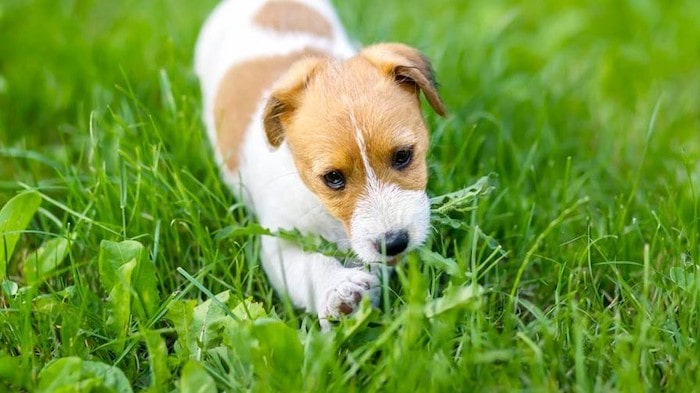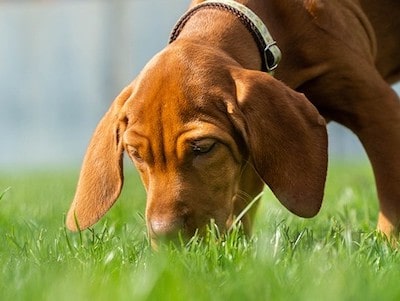Have you ever caught your beloved canine companion munching on grass while out on a walk or in your backyard? If so, you’re not alone. This peculiar behavior has puzzled dog owners and animal experts alike for years. Why do dogs eat grass, and what drives them to engage in this seemingly strange habit?
In this article, we delve deep into the world of our furry friends to uncover the fascinating reasons behind their grass-eating tendencies. From instinctual behaviors rooted in their ancestors’ wild past to potential nutritional considerations, we’ll explore various theories and expert insights to shed light on this intriguing topic.
So, if you’ve ever wondered why your pup prefers to snack on greens from time to time, join us on this investigative journey to unravel the mystery of why dogs eat grass. Let’s get started!
Table of Contents
The Evolutionary and Instinctive Reasons Why Dogs Eat Grass
One of the possible explanations for why dogs eat grass is that they are following their natural instincts that evolved from their wolf ancestors.
Wolves and other wild canids, such as jackals, foxes, and coyotes, have been observed to eat grass and other plant material.
In fact, studies have shown that 2-10% of their stomach contents may contain plant matter. Why do they do that? There are a few possible reasons:

- They may eat grass to supplement their diet with some essential nutrients, such as fiber, vitamins, minerals, or antioxidants. Grass may also help them digest their meat-based diet better by adding bulk and moisture to their stool.
- They may eat grass to ease the pain and discomfort of bloating or excessive stomach gas. Grass may act as a natural remedy for these conditions by stimulating the production of saliva and gastric juices, which can help break down food and expel gas.
- They may eat grass to induce vomiting when they have eaten something toxic or indigestible. Grass may irritate the lining of the stomach and trigger the vomiting reflex, which can help them get rid of the harmful substance.
Some dogs may inherit these instincts from their wolf ancestors and eat grass for similar reasons. For example, there was a case report of an 11-year-old Miniature Poodle that had a 7-year history of eating plants and grass and vomiting afterward.
The problem resolved after the dog was placed on a commercial high-fiber diet. This suggested that this particular dog was eating grass to fulfill some unmet nutritional need, and once provided with adequate fiber in his diet, the grass-eating behavior stopped.
The Behavioral and Psychological Reasons Why Dogs Eat Grass
Another possible explanation for why dogs eat grass is that they are influenced by their behavior and psychology. Some dogs may eat grass for reasons that have nothing to do with their physical health, but rather with their mental state or environment. Some of these reasons are:

- They may eat grass to ease nausea or feelings of sickness. Some dogs may feel nauseous due to motion sickness, medication side effects, or other causes. Eating grass may help them settle their stomach or make themselves vomit, which can make them feel better.
- They may eat grass out of boredom or curiosity. Some dogs may not get enough stimulation or exercise from their daily routine, and may resort to eating grass as a way to entertain themselves or explore their surroundings. Eating grass may also be a tasty treat for some dogs who enjoy the flavor or texture of it.
- They may eat grass as a form of pica, or eating strange nonfood items. Pica can sometimes be caused by a diet deficiency, but it can also be a sign of anxiety, stress, or compulsive disorder. Some dogs may eat grass as a way to cope with these emotional issues or to seek attention from their owners.
Research has found that grass-eating behavior in dogs is influenced by how hungry they are and the time of day. There was less grass-eating when the dog had eaten a meal, and increased grass-eating beforehand. Grass-eating also occurred less frequently later in the day. This suggested that eating grass was normal dog behavior and was not indicative of an underlying illness.
Another theory is that eating grass is a displacement behavior in dogs. Displacement behavior happens when an animal has conflicting motivations and does something unrelated to resolve the conflict. For example, a dog may want to chase a squirrel but is restrained by a leash, so it starts licking its paw instead. Similarly, a dog may want to do something else but is prevented by some obstacle, so it starts eating grass instead.
Potential Risks of Eating Grass
While eating grass is generally considered harmless for dogs, there are some potential risks that you should be aware of. Here are some of them:
- Parasites: Some plants may harbor parasites that can infect your dog if they ingest them. For example, some types of worms can be transmitted through contaminated soil or vegetation.
- Pesticides: Some plants may be treated with pesticides or herbicides that can be harmful for your dog if they ingest them. These chemicals can cause various symptoms such as vomiting, diarrhea, seizures, or even death in severe cases.

- Toxins: Some plants may contain toxins that can be poisonous for your dog if they ingest them. For example, some types of mushrooms, flowers, or berries can cause various symptoms such as drooling, tremors, or coma in severe cases.
- Foreign bodies: Some plants may have sharp or hard parts that can cause damage to your dog’s mouth, throat, or digestive tract if they ingest them. For example, some types of grasses, seeds, or sticks can cause cuts, ulcers, or obstructions in severe cases.
Tips to Prevent or Manage Grass-Eating
If your dog eats grass occasionally and does not show any signs of illness or discomfort, you may not need to worry about it. However, if your dog eats grass frequently or excessively, or if you notice any negative effects from it, you may want to take some steps to prevent or manage it. Here are some tips:
- Check with your veterinarian to rule out any medical issues that may cause your dog to eat grass, such as nutritional deficiencies, gastrointestinal problems, or parasites.
- Provide your dog with a balanced and high-quality diet that meets their nutritional needs and preferences. You may also consider adding some fiber-rich foods or supplements to their diet if they lack fiber.

- Keep your dog away from lawns or gardens that are treated with chemicals or contain potentially toxic plants. You may also wash their paws and mouth after they have been outside to remove any residues.
- Provide your dog with plenty of mental and physical stimulation to prevent boredom or stress. You can play with them, walk them, train them, give them toys, or enroll them in activities that suit their personality and energy level.
- Redirect your dog’s attention when they try to eat grass. You can use positive reinforcement techniques, such as praise, treats, or toys, to reward them for leaving the grass alone and focusing on you instead.
- Consult your veterinarian if your dog continues to eat grass despite your efforts, or if they show any signs of illness or discomfort from it. Your veterinarian may prescribe medication or recommend other treatments to help your dog stop eating grass.
FAQ
Is it safe for my dog to eat grass?
In most cases, occasional grass consumption is not harmful to dogs. However, it’s essential to ensure the grass is free from pesticides or harmful chemicals. If your dog frequently eats large amounts of grass or shows signs of discomfort after consuming it, consulting your veterinarian is advisable.
Could stress or anxiety be causing my dog to eat grass?
It’s possible that stress or anxiety could influence your dog’s behavior, including their grass-eating habits. If you suspect this might be the case, consider addressing any potential stressors or consult a professional dog behaviorist.
Do all breeds of dogs eat grass?
Grass consumption is a common behavior across various dog breeds. However, individual dogs may differ in their propensity to eat grass.
When should I be concerned about my dog’s grass-eating behavior?
If your dog is consuming excessive amounts of grass, vomiting frequently, or showing signs of distress after eating grass, it’s essential to consult your veterinarian for a thorough evaluation.
Conclusion
In conclusion, the mystery behind why dogs eat grass remains multifaceted, with no single definitive answer. While some theories point to instinctual or nutritional factors, others suggest behavioral or even environmental influences. The majority of dogs engaging in occasional grass consumption do so without any adverse effects.
As responsible pet owners, it’s essential to monitor our dogs’ grass-eating habits, ensuring they have access to safe and chemical-free areas. While occasional grass consumption is generally considered harmless, excessive or abnormal behavior warrants attention and may require a veterinary consultation.
Understanding our canine companions’ behaviors helps us nurture a happy and healthy bond with them. So the next time you spot your dog munching on grass, you can ponder the various intriguing reasons behind this fascinating yet enigmatic canine habit.


